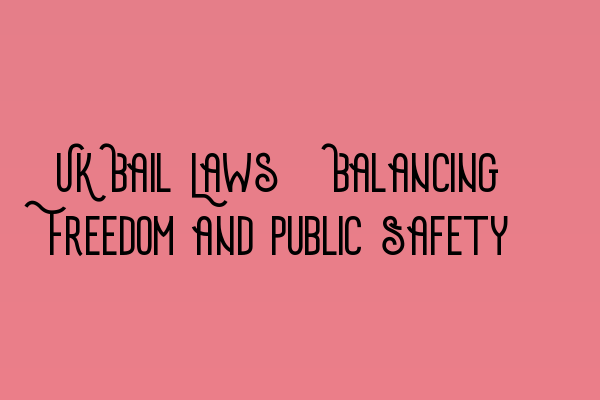UK Bail Laws: Balancing Freedom and Public Safety
When it comes to criminal cases, one of the key considerations is whether or not the defendant should be granted bail. Bail serves as a mechanism to balance the fundamental right to freedom against the need to protect the public safety. In the UK, bail laws play a crucial role in determining whether an individual should be released pending trial or be kept in custody.
As a solicitor at SQE Criminal Law & Practice Law UK, I often come across cases where the bail decision is a critical factor. In this blog post, we will explore the UK bail laws in detail and discuss the delicate balance between granting freedom and ensuring public safety.
The Purpose and Principles of Bail
The purpose of bail is to allow individuals accused of a crime to be released from custody under specific conditions until their trial. By granting bail, the criminal justice system acknowledges the presumption of innocence and ensures that defendants are not unduly punished before they have been proven guilty.
However, the principles of bail are twofold. On the one hand, it aims to protect the individual’s right to freedom and prevent them from being held in custody unnecessarily. On the other hand, it must also consider the need to protect the public from potential harm or interference by the accused.
The Factors Considered in Bail Decisions
When deciding whether to grant bail, the court considers several factors. These include:
- The seriousness of the offense
- The likelihood of the defendant absconding
- The risk of reoffending
- The defendant’s ties to the community
- The defendant’s previous criminal record, if any
Additionally, the court may consider the strength of the evidence against the defendant, their personal circumstances, and any potential risk they pose to witnesses or the public.
Bail Conditions and Alternatives
When granting bail, the court has the power to impose conditions on the defendant to ensure their compliance with the law and to protect public safety. These conditions may include:
- Reporting to a police station regularly
- Surrendering travel documents
- Staying away from certain locations or individuals
- Refraining from engaging in certain activities
In cases where the court believes that bail conditions alone may not be sufficient, it may consider alternatives to imprisonment. These alternatives could include electronic monitoring, tagging, or the use of a designated address where the defendant must reside until the trial.
The Importance of Legal Representation in Bail Applications
Given the significant impact that bail decisions can have on a defendant’s life, it is crucial for individuals to have access to legal representation during bail applications. Solicitors experienced in criminal law, like those at SQE Criminal Law & Practice Law UK, can provide skilled advocacy and demonstrate to the court why their client should be granted bail.
With their comprehensive knowledge of bail laws and experience in handling similar cases, solicitors can gather relevant evidence, present compelling arguments, and address any concerns regarding public safety to maximize the chances of a successful bail application.
Conclusion
The UK bail laws aim to strike a delicate balance between protecting an individual’s right to freedom and ensuring public safety. The careful consideration of various factors by the court helps determine whether bail should be granted, and if so, under what conditions.
As a solicitor at SQE Criminal Law & Practice Law UK, I understand the importance of bail decisions in criminal cases. If you require legal assistance or have any questions regarding bail laws, please don’t hesitate to contact us. Our team of dedicated professionals is here to help.
Related Articles:
- SQE 1 Practice Exam Questions
- SQE 1 Practice Mocks FLK1 FLK2
- SQE 2 Preparation Courses
- SQE 1 Preparation Courses
- SRA SQE Exam Dates
